This event has ended, go here for continuing coverage.
What to know about the 2023 Aspen Ideas Festival
- The Aspen Ideas Festival is hosted by the Aspen Institute, a nonprofit founded in 1949 that is dedicated to “change through dialogue, leadership, and action to help solve the most important challenges facing the United States and the world.”
- Wednesday's speakers and moderators include actor John Leguizamo, NBC News anchor Tom Llamas and New York Times financial columnist Andrew Ross Sorkin.
- NBCUniversal News Group is the media partner of the Aspen Ideas Festival.
An fast-paced, intense conversation
That’s a wrap on one of the more intense panels I’ve been to in Aspen.
We’ll be back tomorrow to cover talks on a wide variety of important topics, including immigration, education, the Supreme Court and much more.
Wrongfully detained... and still owing taxes to the IRS
Rezaian said that it’s important to support detainees and families even after they are released, nothing that they can still face a variety of challenges, including issues like back taxes.
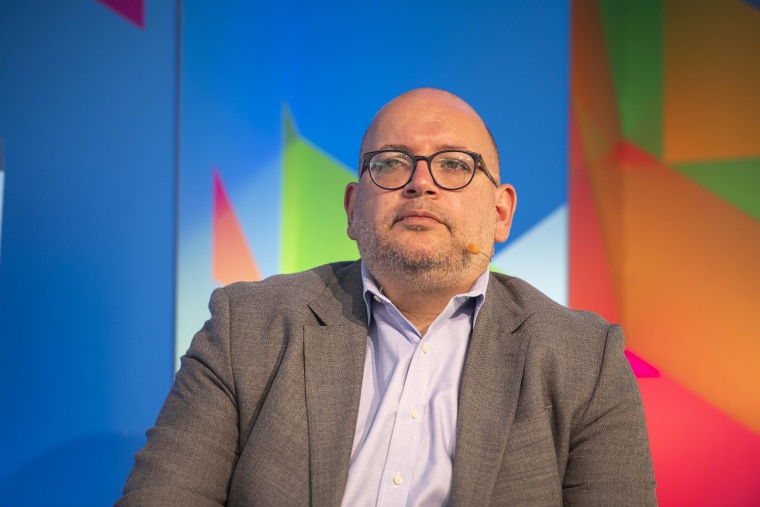
“When I came back, and I watched others who came back with me, struggle with things like the IRS and credit scores,” he said. “You’re just not equipped to deal with it.”
Rezaian added they he ended up paying $6,000 in back taxes, even after working extensively on the issue with Carstens.
Gilbert said earlier she hopes the Center for Strategic and International Studies commission can help resolve problems like back taxes for those wrongfully detailed.
What calculations went into exchanging Griner for a Russian arms dealer
In response to an audience question about releasing Griner in exchange for a Russian arms dealer, Carstens said the decision is up to the president but the government did a national security analysis to determine the national security risks in releasing him.
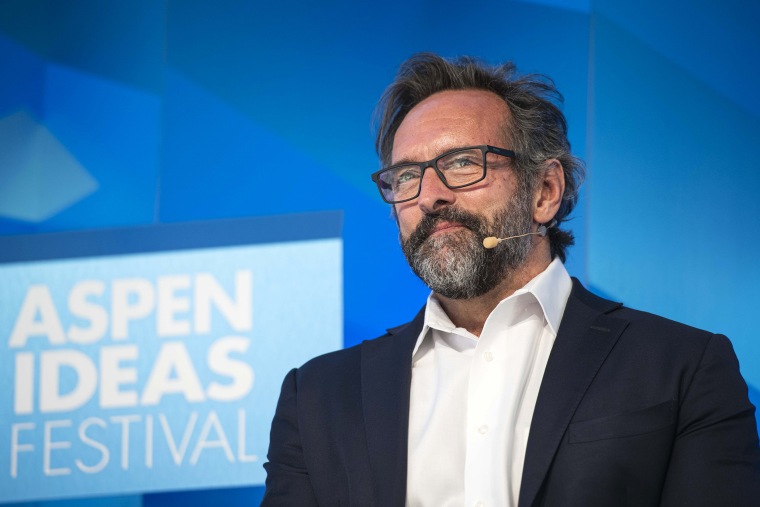
He also said the top priority for his office is bringing Americans home.
“I want Brittney Griner back in this country because she has a blue passport and if you have a blue passport, we’re coming to get you,” he said.
Prevention and deterrence are key to preventing hostage taking in the first place
Carstens encouraged people to go online to look at travel.state.gov for advice on traveling in foreign countries. He said there are growing efforts around prevention and deterrence of wrongful detention.
“I think in the coming year or two, we’re going to try to build out some protocols and programs that will actually address that but right now, it’s an area of weakness,” he said.
Carstens added that it will take coordinating with allies and focus on using a variety of tools — from diplomatic and economic to military power.
“If in 15 years, we can show the people that do this, that the price of doing so is too high for them to do it, then that’s going to be a victory for us,” he said.
Rezaian talks about how he felt the moment he was released
Rezaian, recounting his release, said there was a combination or relief and sadness knowing that he and his wife would never be able to return to Iran.
He also said that his release almost didn’t happen — and that there were even bigger issues in the mix.
“Apparently, the whole thing almost fell apart,” he said. “And when I say the whole thing, I don’t just mean me and other Americans coming home. The entire JCPOA nuclear deal almost didn’t happen.”
Individuals and organizations are working to recover and support detainees
In response to Llamas asking how we can support the family of Paul Whelan, Carstens says he has weekly calls with the family of Paul Whelan — sometimes more often — and then the government is committed to bringing him home.
“I don’t have another job. I do one thing: this,” he said. “And I have the full support of the secretary [of state], the president to get it done.”
Gilbert said that there are organizations that focus on supporting the families of detainees, including one that she is working on with Rezaian — a commission at the Center for Strategic and International Studies to develop tools, policies and strategies to address wrongful detentions.
Public outcry helps detainees, Rezaian says
Rezaian said he had almost no information from the outside world while detained, but that high-profile and organized calls for the release of detainees can make a difference.
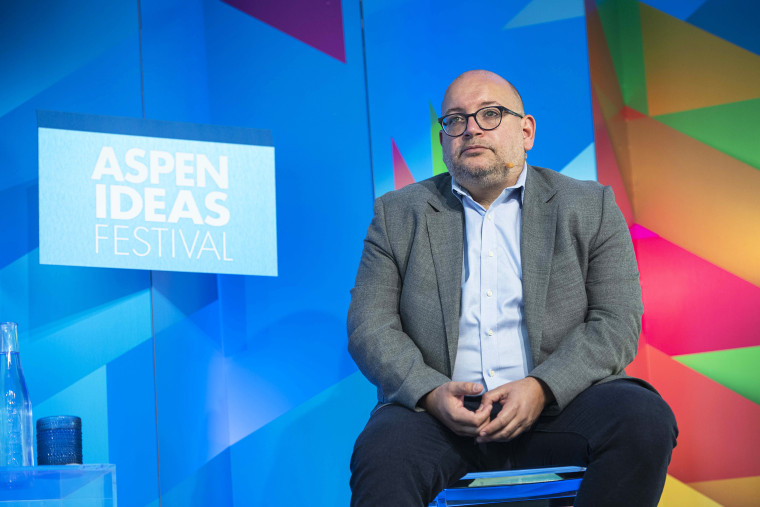
Rezaian said a guard told him that Muhammad Ali had called for Rezaian’s release, and that Ali’s position in the Muslim world made a difference.
He said it’s good to see people being more vocal about U.S. detainees.
“One of the things that I think has happened, especially after my case, is people kind of becoming more bold in their advocacy more quickly,” Rezaian said.
American attitudes and debates around hostage recovery
Gilbert, speaking to a question from Llamas about how politics plays into hostage diplomacy, said there are complicated domestic politics that related to different hostages.

She said that the American public is very supportive of hostage recovery, but that they are also aware of the circumstances of how a hostage was captured — meaning that there can be controversy if a hostage is perceived as doing something to deserve detention.
Gilbert pointed to Bo Bergdahl, who was captured but the Taliban and held for five years after he walked off his base in Afghanistan.
“We’re Americans. We value our liberty. We value our freedom. We have freedom of press that reports on these stories,” Gilbert said. “All of that pushes in the direction of putting pressure on the administration. And at the same time, it opens up the ability for there to be a big debate about whether or not it’s worth it to make concessions to bring someone home who was doing something risky at the time of their capture.”
State Department works around what detainee families want to do
Rezaian said that he often talks to families of journalists and other people who are held hostage, noting that he sometimes sets aside his role as journalist to offer advice, guidance and support.
He added that he usually encourages pushback on narratives released by foreign governments related to U.S. prisoners.
Carstens said that Secretary of State Antony Blinken encourages the families of U.S. prisoners to do what they feel is best. “He’ll tell them, ’do what you feel you need to do,’” Carstens said.
He added that the State department works around what a detainee’s family wants to do.
How it's determined if someone is wrongfully detained
Gilbert said that not all imprisoned Americans will be designated as “wrongfully detained.”
It depends on a variety of issues including criteria that show that a person “is effectively being held hostage, that they were arrested because they are an American, and they were arrested for the explicit or implicit purpose to be used for leverage in a negotiation with the U.S. government.”
The way prisoner exchanges go down and the 'Bridge of Spies' moment
Carstens said the actual mechanics of prisoner exchanges is very deliberate.
“We get off our plane. They get off their plane. We meet in the middle, and then I take them over to my plane or vice versa,” he said. “We identify who we’re switching. And then we have that ‘Bridge of Spies’ moment. And the reason we do that is just making sure that both sides were honest when it came to the tarmac where the switch was going to be made. And you can watch the most recent one with Brittany [Griner].”
Carstens say his work is a far cry from a sleepy bureaucratic job
Carstens said the daily work of hostage negotiation can be hectic and that every negotiation is different.
“My office is like hospital emergency room,” he said. “It’s frenetic activity all day long, because we know the stakes are huge.”
Carstens said that humanity and empathy is key to negotiations.
“I can tell you that if you’re going to do this job, you need to bring your rational side, but you definitely need to bring that human, intuitive, emotionally available and empathetic side as well,” he said.
Rezaian still backs Carstens
In response to a question from Llamas about why he supported Carstens, who was appointed by President Donald Trump, Rezaian said he stands by what he wrote and added that the ambassador has made major strides.
“He had a vision, and I think was important to let that play out,” Rezaian said of Carstens.
The problem is tied to the rise of 'autocrats and authoritarians'
Gilbert said that geopolitical changes — most notably resurgent autocrats — mean that hostage diplomacy has become more relevant.
“Hostage diplomacy is a tool of autocrats and authoritarians,” she said. “It’s a tool that bad actors around the world can use to take advantage of wealthy Western democracies that care about the freedom and liberty of their citizens around the world.”
First off, let's talk about the Americans being held in Russia
Llamas starts off asking about Evan Gershkovich, the Wall Street Journal reporter currently being held by Moscow on espionage charges.
“They’re not willing to really talk to us about him yet,” Carstens said of Russia’s government, though he offered some optimism.
He also said they are working to gain the release of Paul Whelan, an American businessman and former Marine who has been held by Russia since 2018.
Carstens added that he spoke with Whelan after Russia released Britney Griner. He said the Russians offered a deal only for Griner.
Carstens recounted telling Whelan: “We’re not going to stop my foot is on the gas pedal. We’re going 110 miles an hour. We will not relent until we bring you home.”
In response to a question about what Gershkovich may be going through, Rezaian said it’s “a game of mental torture.”
“A lot of things are going through your mind. One of them is, do you go towards despair, or do you hold out hope?” Rezaiain said. “And it’s a very stark choice between being your own best friend or your own worst enemy. I chose to be a friend to myself.”
Llamas talks to the foremost experts on hostage diplomacy
We’re here at the panel “The Dilemmas of Hostage Diplomacy,” which will cover tough questions about how to secure the release of American prisoners.
The panel features Roger Carstens, special presidential envoy for hostage affairs in the U.S. State Department; Jason Rezaian, a Washington Post opinion columnist who was once held for 544 days in Tehran on espionage charges; and Danielle Gilbert, the David and Cindy Edelson Fellow at Dartmouth College.

NBC News’ Tom Llamas is hosting.
Up next on the blog: The Dilemmas of Hostage Diplomacy
Next up, we'll be covering the panel on the difficult calculations involved in hostage diplomacy.
NBC's Tom Llamas will moderate the discussion, which will include Washington Post Global Opinions Writer Jason Rezaian, Dartmouth fellow on U.S. foreign policy and international security Danielle Gilbert and State Department Special Presidential Envoy for Hostage Affairs Roger Carstens.
Wealth inequality is now as wide as it was during the Gilded Age
After a brief pause during the pandemic, wealth inequality has begun to widen again, some economists say.
Ferguson is among those who subscribe to that view, noting the gap between the 1% and 99% is now as wide as it was during the Gilded Age.
He said education will be critical to addressing this issue — and that if it is not dealt with, current political schisms will worsen.
Scharf largely agreed, calling for mandatory financial education at as many levels of schooling as possible.
"Name the class you took on how to deal with personal finances in a meaningful way," he said.
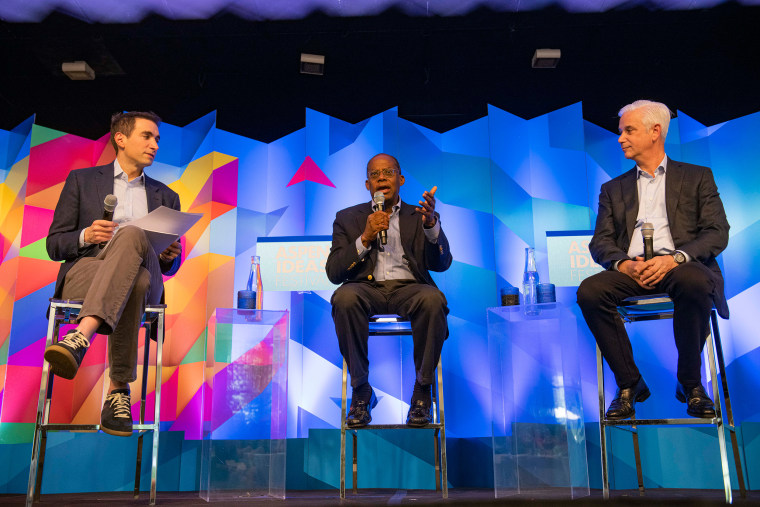
The bottom line for corporations on socially conscious issues
When it comes to the recent backlash from conservatives against corporations considering policies involving ESG —which stands for environmental, social, and governance — Scharf said how his bank thinks about those issues hasn't changed: It still comes down to listening to voting members on the company's board of directors and shareholders.
"We have to think about that broad range of stakeholders — that's who we're here to satisfy," he said.
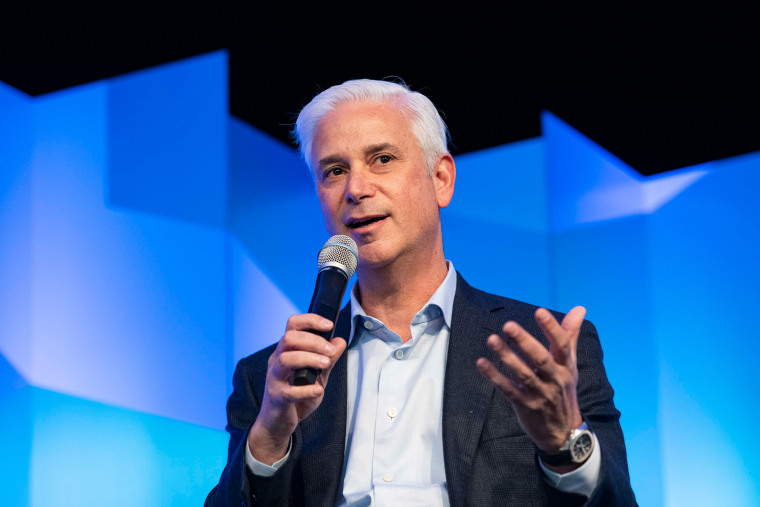
Broadly speaking, 'banks are in great shape,' Wells Fargo chief says
Banks have come a long way from the global financial crisis of 2008, Wells Fargo CEO Charlie Scharf told Sorkin.
In response to a question of about whether woes in the commercial real estate sector could start to affect the financial sector, Scharf said there was little reason to be worried.
"Banks are in great shape," he said, noting their capital levels were double what they were more than a decade ago. He also said banks aren't able to take the same kind of risks that helped lead to the previous crisis.
While there may be some institutions that could face turmoil, "banks will do just fine," Scharf said.
More than two rate hikes are likely, says former Federal Reserve vice chair
Speaking in a panel moderated by CNBC's Andrew Ross Sorkin, former Federal Reserve Vice Chair Roger Ferguson said he expects the central bank to increase interest rates more than two more times as it works to battle what he called "intractable" inflation.
"Depending on where you sit [in the economy], there's lot of good... but also some bad places," he said. Ferguson added that while parts of the tech sector have rallied, real estate — and especially commercial real estate — is struggling.
"Everyone's been surprised by the resilience... but the reason I think a recession is more likely than not is history," he said.
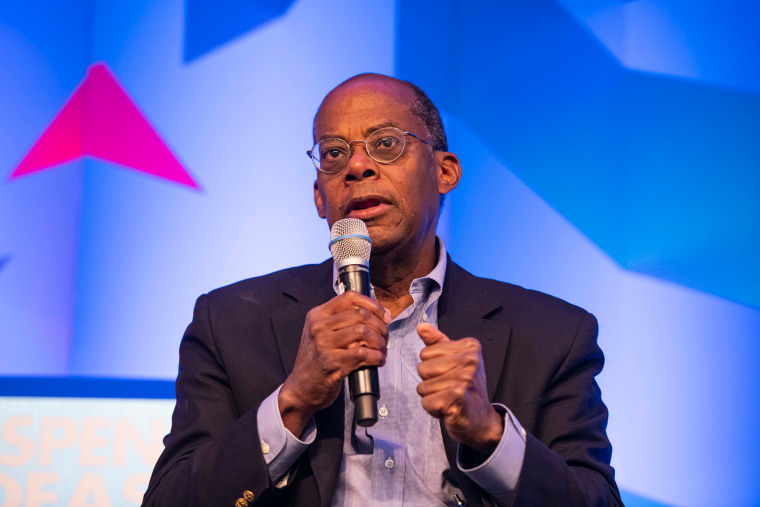
Inspiring leaders, as advertised
And that’s a wrap from a panel that lived up to its name.
We’ll be back in a bit with a discussion on what’s next for the U.S. economy.
What keeps these inspiring leaders going every day?
In answer to a question about how they keep themselves going, Burton said that anger can be a fuel — but it can’t be the only fuel.
“I had enough anger to fuel a spaceship to the moon,” she said.
“The anger was not going to be what took me to where I needed to be,” Burton continued. “So I worked through so much forgiveness and compassion, not only for others, but for myself. And the love that comes out of that is the fuel that keeps me going.”
Leguizamo said said allyship helps him relax, knowing that he doesn’t have to fight on his own.
“When white allies, Black allies, Asian allies, Jewish allies support me, I feel relaxed, and I feel good. And I feel like we’re all together,” Leguizamo said.
Coleman Flowers offered a bit of levity by sharing how she relaxes: “I watch a lot of trash TV.”
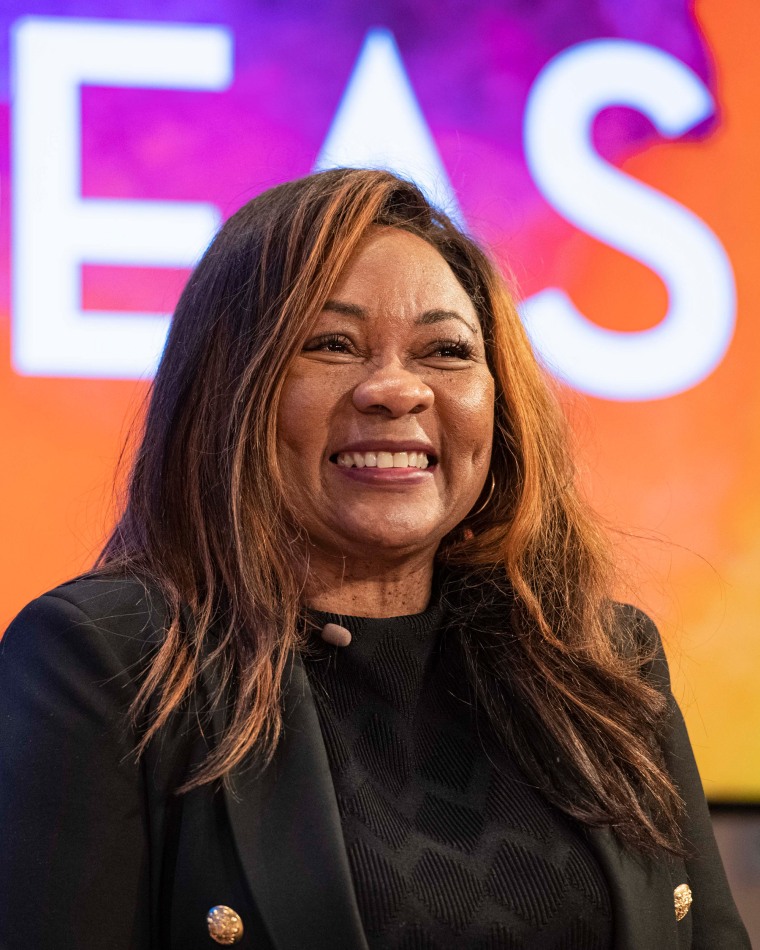
In seriousness, though, she added that acknowledging her success helps, too.
“The other thing that helps me relax is to just talk about where I’ve come from, and recognizing that you know, a little black girl from Lowndes County, Alabama, can end up at the White House,” Coleman Flowers said. “Anything is possible.”
Why does it feel like everything's gotten worse despite all this new technology?
Despite being surrounded by new technology and gadgets, Rattner points out that labor productivity has actually declined in the past decade. The reasons for this are numerous, but the bottom line is that it makes sense that workers would feel less well off.
Economists have studied this productivity slowdown, with some blaming factors like decreased competition in the marketplace and changing corporate governance incentives that encourage payouts as having led to lower levels of investment.
While artificial intelligence applications like ChatGPT may help increase productivity — according to Goldman Sachs, global GDP could be boosted by 7% annually over a 10-year period — it could also affect 300 million jobs worldwide.
"That's creative destruction," Rattner said. "Some jobs will disappear, but others will be created."
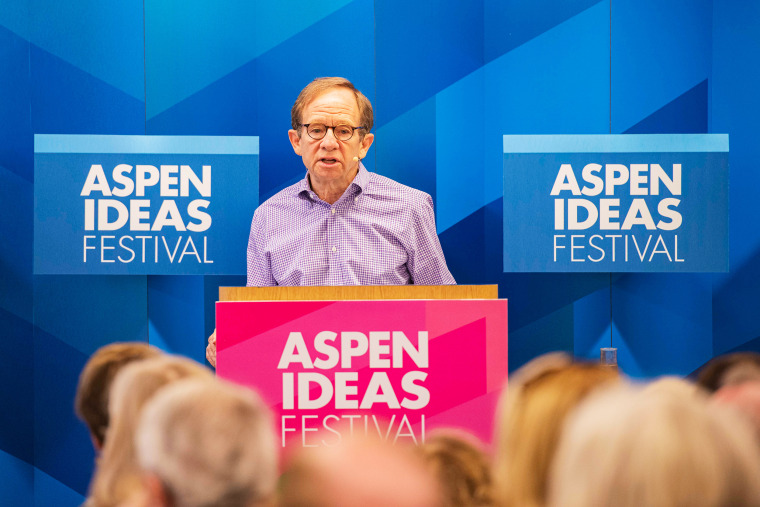
What does liberation mean to you?
In response to an audience question about what liberation looks like, Leguizamo said liberation looks like parity.
“When I see 20% of the faces in front of the camera, 20% of the executives are Latino, 20% of the stories are Latino, 20% of the crew, that’s when I feel liberated,” he said.
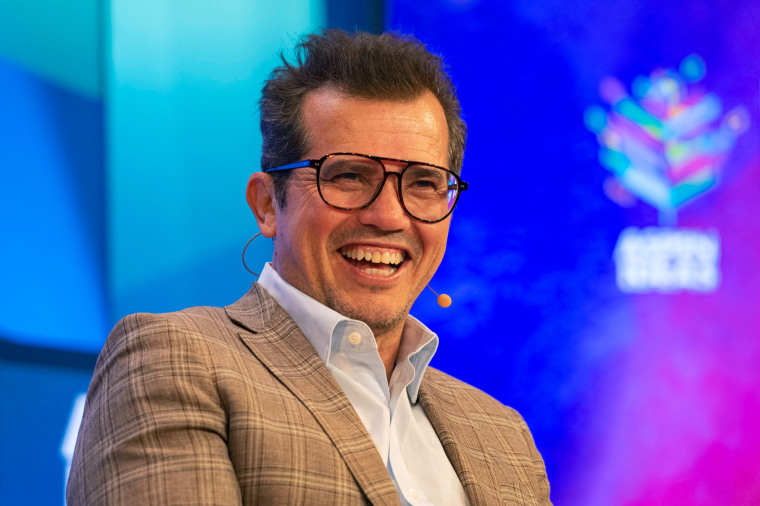
Flowers said liberation means the Constitution applies to all of us and that someday she won’t have to fight the same battles as her parents’ generation.
How do you keep doing important, difficult work?
Burton, speaking the challenges of advocating for minority communities, said it is crucial to know that there are going to be good days and there are going to be bad days.
“I would say you don’t show that you’re worthy, you know that you’re worthy,” she said.
Rattner on why the economy has not entered a recession
One reason why the U.S. economy has yet to enter a recession, according to Steven Rattner, is that there are now huge tax rebates to be had for green energy projects, as well as semiconductor manufacturing, thanks to President Biden's Inflation Reduction Act and the CHIPS and Science Act.
He cites $52 billion that is now being invested in new semiconductor facilities, and that the combined effect of the bills has been the creation of some 200,000 construction jobs.
Burton points to prison labor as an example of a larger problem
Llamas asked Burton what she would change if she could change one thing about the justice system, and Burton pointed to the labor done by prisoners.
“Really, you’re slave,” she said.
Burton said that exploitation of prisoners is part of the broader issue around how prisons punish people but do little to rehabilitate them.
“I think people are understanding that there is a better use of resources,” she said. “And that you know, people are not throwaway people. They have potential, and if we want to create a better society, we have to include everybody.”
Burton said that entering a home can be a shock to people who were just recently released from prison.
“One woman came home ... she had been gone for like 25 years, and after about two hours she had walked back into the office and she said 'I just opened a refrigerator,'” Burton said. “She came back in the office with tears in her eyes to say 'I just opened a refrigerator,' and it still brings tears to my eyes to think about that moment.”
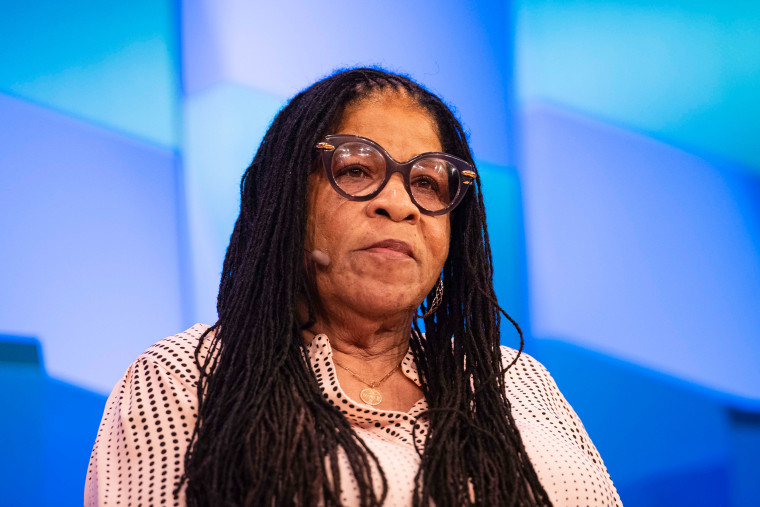
Working to draw national attention to crucial local issues
In answer to a question about generating national attention for local issues, Coleman Flowers said it was crucial to bring people to Lowndes to show them the conditions while also writing and speaking about her experience
She said that work helped her build connections with people in other parts of the country who were going through the same thing.
“I think that what we what we’ve done by bringing it to the forefront is allowed people to not to be ashamed to talk about sewage, because a lot of people have been made to feel like it was a personal issue,” Coleman Flowers added.
She said the United Nations was also invited to see the conditions in Lowndes, which brought global attention to the issue.
Leguizamo on underrepresentation and 'survivor's guilt'
Speaking to the ideas behind his new MSNBC show, “Leguizamo Does America,” Leguizamo said Latino underrepresentation in Hollywood and across the U.S. combined with his own experiences pushed him to look for a way to tell the stories of his community.
“I survived it, and I’ve succeeded, so I’ve always felt a sort of guilt, a survivor’s guilt,” he said. “So I felt like I had to do something.”
He said he pitched the entertainment industry for decades with no success. The difference, he said, was that he now sees more Latino representation in leadership in the media.
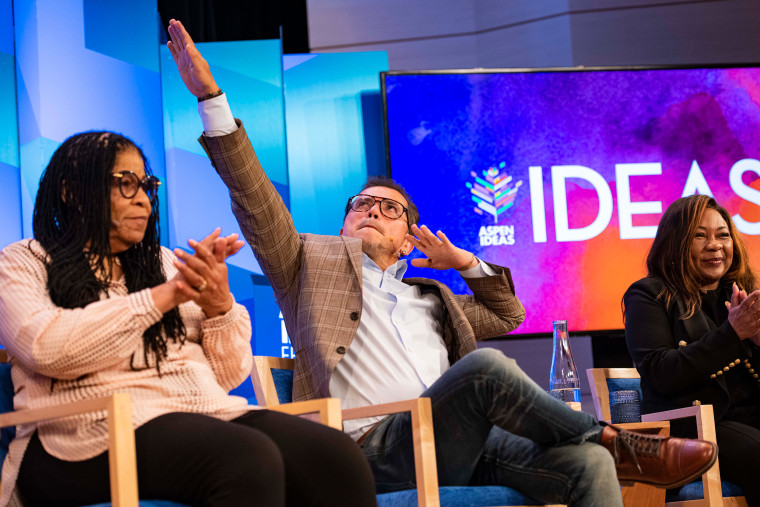
Building homes and rebuilding lives for formerly incarcerated women
Burton spoke about how she came to help people leaving prison re-enter society. She said that her own experience informed her efforts to make homes for women, allowing them to begin rebuilding their lives.
She said her organization now has 12 homes in Los Angeles County but has also gone beyond housing.
“What I discovered is that it was more than just having a home. There were structural institutional barriers that had to be addressed,” Burton said. “So we built out a policy department, a legal department and workforce development department and organizing department. And you know, things that help women and people be able to start a new life.”
She added that her organization has had a 94% success rate.
Raw sewage in yards is still a reality in parts of America
In response to a question from Llamas about how some parts of American can lack basic services like sewage system, Coleman puts it bluntly: “I’ve been asking a question for a very long time.”
She said that it has been a yearslong struggle to bring attention to septic issues in Lowndes County, Alabama, which has disproportionately affected Black residents.
Coleman said that there has been progress.
“When I saw President Joe Biden when I went to the White House, he said he had gone [to Lowndes] for years and nobody had ever mentioned this to him," Coleman said. "But he’s now he promised me that he’s going to fix.”
Panel coverage: 'If the Economy Is Still Good, Why Are Americans So Grumpy?'
Steven Rattner, the former "car czar" and current Michael Bloomberg adviser, is walking the audience through a series of charts that seek to answer the question posted in the name of his presentation: "If the Economy Is Still Good, Why Are Americans So Grumpy?"
In 2008, Rattner notes, Americans were grumpier about the economy than they are now — but the current dismal ratings are "close" to those levels, Rattner said.
Interestingly, he says, people rate their own economic situation better than their rating for the situation of their community or country.
One reason is that those latter ratings have become profoundly political: Republicans, and to a lesser extent independents, rate their view of the national economy much lower than Democrats do. Historically, those views tend to track which party is in office — but the divides have never been starker, Rattner said.
It's one reason why President Joe Biden's approval rating is not higher given decades-low unemployment, he added.
Panel coverage: Leaders Inspiring America
We're here and ready to live blog a panel on "Leaders Inspiring America," part of NBCU News Group's project honoring Americans making a difference.
NBC News anchor Tom Llamas will moderate a panel featuring Catherine Flowers, an environmental and climate justice activist, Susan Burton, creator of the non-profit organization A New Way of Life, and actor John Leguizamo.
A couple notable people spotted in the crowd: actors Felicity Huffman and William H. Macy.
McBath on pushing gun reform in the House
McBath, who was on the “Wicked Problem: Guns in America” panel today, recently spoke to MSNBC's Jonathan Capehart on the anniversary of Biden's Bipartisan Safer Communities Act.
She talked about how House Democrats are putting pressure on the Republican majority to act on gun reform.
Not to be overlooked in the gun debate: Suicides
While mass shootings garner the most media coverage, suicides make up an even larger proportion of gun violence in the United States: Of the 45,000 to 50,000 people killed by guns every year, the majority are suicides, said Jennifer Carlson, associate professor of sociology and government and public policy at University of Arizona.
To address this, the panelists agreed, there needs to be a multi-pronged approach: improving the nation's mental health; making sure guns are stored safely away from teenagers or others who may be suicidal; and training gun sellers to recognize signs of suicidal ideations in potential buyers.
"They, as credible messengers, not law enforcement, not a therapist, but [are] someone that can just stop and say, 'Do you really want to buy this gun right now?'" Carlson said. "That’s actually been effective."

Everytown president: Laws alone can't solve 'complicated problem'
Everytown for Gun Safety's president John Feinblatt argues that we "make a mistake when we just debate the laws" in trying to solve the complicated problem of gun violence.
"The truth is, the industry can do more to make guns safer," he said. "We’re not talking about getting rid of guns, or stop manufacturing guns, but there are innovations."
Among the innovations Feinblatt suggests: palm-print recognition, so only the rightful owner could fire a gun; reweighting the trigger of a gun, to prevent a child from being able to discharge a gun; and educating gun owners about proper firearm storage.
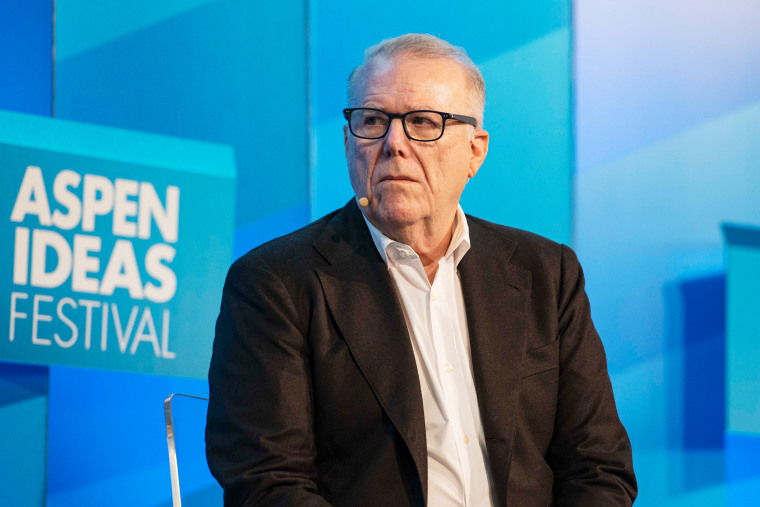
How 'trauma fatigue' prevents debate on guns from moving forward
Jennifer Carlson, associate professor of sociology and government and public policy at University of Arizona, pointed out that when it comes to guns in America, there is an "overwhelming consensus" on certain subjects, such as background check reform.
Yet there are no simple answers to getting both sides to agree to changes, she said, adding that after mass shootings happen, people often move on.
"We have this massive coverage. We have a two-week time span and then, you know, the trauma fatigue sets in," she said. "We go on to the next story, and we don’t talk about, for example, the fact that most of us in this room will know someone or be directly impacted by gun violence over the course of our lifetime."
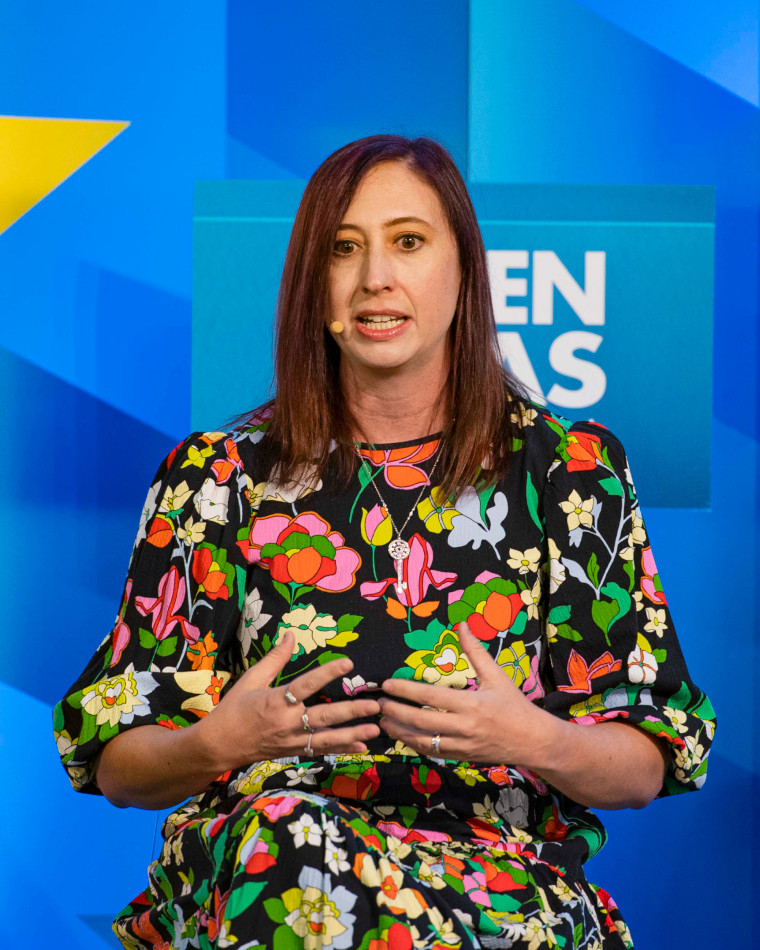
McBath on gun violence: 'We’re looking at a public health crisis'
Wednesday's panel on gun violence opened with a montage featuring news coverage from some of the worst mass shootings in the United States: Columbine; Sandy Hook; the Pulse nightclub shooting; Uvalde; Highland Park; and many more.
Moderator Jenn White asked Rep. Lucy McBath, D-Ga., how much has changed since she first started advocating for gun safety after her son, Jordan Davis, was shot and killed in 2012 while sitting in a friend’s car at a gas station.
"Things are changing, because no one wants to be me. No one ever wants to be a victim. No one ever wants to be a survivor of gun violence," she said.
But, she added, while gun safety advocates are making strides, "this is a slow process."
"We’re looking at a public health crisis that has been evolving over years. It is a cultural crisis that we’re dealing with and it will take time to dismantle this cultural crisis," she said. "But, yes, things are changing."
Kicking off Wednesday: A deep dive into America's gun problem
Wednesday kicks off with a panel called “Wicked Problem: Guns in America,” which features a discussion between Rep. Lucy McBath, whose son, Jordan Davis, was shot and killed in 2012, John Feinblatt, president of Everytown for Gun Safety, and others.
The focus of the panel: There is no question that the U.S. is an outlier in both gun ownership and gun violence. But there is debate over the underlying causes of the grim statistics unique to this country, as well as the solutions that would make it a safer place to live.
Joined by Jenn White, the host of NPR’s “1A,” Clark Neily, the senior vice president for legal studies at the Cato Institute and Jennifer Carlson, an associate professor of sociology and government and public policy at University of Arizona, McBath and Feinblatt will discuss how to remove the obstacles that prevent a reduction in gun violence in America.
Cheney says she won’t do anything that 'helps' Trump as she weighs White House bid
Former Rep. Liz Cheney — one of the most vocal GOP critics of Donald Trump — is staying mum on her 2024 plans but said in an interview Tuesday that she has no intention of taking any steps that would help the former president return to office.
“I’m not going to do anything that helps Donald Trump,” Cheney told NBC News’ Lester Holt at the Aspen Ideas Festival. “I’ll make a decision about sort of what I do, and what comes next, later on this year.”
Cheney, who represented Wyoming in Congress for six years before losing in the 2022 GOP primary to a Trump-backed candidate, was also asked whether she would run as a Republican or a third-party candidate if she were to launch a White House bid.
“The way that I’m thinking about where we are and what has to be done is much less about, you know, what should I do in terms of am I going to be a candidate or not ... and much more about stopping Donald Trump whatever that takes,” she said.
Welcome to Day 5 of the Aspen Ideas Festival
Lots more in store for today.
Panelists and participants will tackle questions around guns violence in America, what's next for the economy, how infrastructure intersects with climate change and the dilemmas of hostage diplomacy — just to name a few.
Check back here throughout the day for all the latest.


